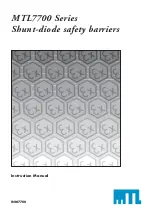
7
INM7700-6
Jan 2010
5
WIRING CONNECTIONS
5.1
General
This section describes wiring connections as follows:
a) Barrier connections
Section 5.2
b) Connections to plant earth
Section 5.3
c) Connections to dummy barriers
Section 5.4
5.2
Barrier connections
Each barrier has 4 or 8 terminals, 2 or 4 on each side, allocated as
follows:
Safe area
Terminals 1,2,5 and 6
Safe-area power
Sections
and signal lines
5.2.1 and
5.2.2
Hazardous area
Terminals 3,4,7 and 8
Hazardous-area
Section
signal lines
5.2.1
Torque the screw terminals to 0.4Nm.
5.2.1
Signal line connections
Connect signal lines to the screw terminals at both sides of the barrier
(1 and 2 and/or 5 and 6 at the safe-area side, 3 and 4 and/or 7
and 8 at the hazardous-area side). The safe-area terminal 1 is also
used as a power connection when power is provided from the safe
area (see section 5.2.2 for details).
Clearly segregate hazardous-area and safe-area cabling as defined
by relevant codes of practice, and route cabling to the barriers
through clearly separated and identified conduits or trunking. Deal
with spare cable cores or screens as described in section 5.2.3.
Before making any signal connections from the hazardous area,
make sure any energy-storing devices (ie, devices NOT classified as
‘simple apparatus’) are certified as being compatible with the
barriers to which they will be connected. Check also that the
connecting cables conform with the cable types specified by the
safety documentation and that the maximum cable parameters
specified in MTL’s IS catalogue are not exceeded. In general, cable
parameters are unlikely to present problems except in installations
where cables longer than 500m are called for in IIC applications.
Do not connect barriers to safe-area equipment that is supplied from
(or contains) a source of potential with respect to earth that is greater
than 250V rms or 250V dc under normal or fault conditions, unless
this is specifically permitted by the safety documentation. This
limitation does not apply to safe-area equipment fed by a three-phase
440V neutral earth supply.
See Appendix A for examples of wiring connections for specific
applications.
5.2.2. Power supply connections general considerations
Take care that if barriers are connected to a safe-area power supply,
connections are made correctly. If the internal safety fuse blows, it will
destroy MTL7700 barriers. See Appendix A for specific connections
for individual barriers and applications.
5.2.3
Bussed Power applications and connections
When a number of barriers use a common power supply, the optional
power link (BPL7700) can be used. Typical applications include
hazardous-area switches, solenoids and 4–20mA transmitters; and
the barriers it can be used with are the MTL7706, ,
, M and MTL774x. See figure 14 for a typical
power link installation applied to hazardous-area switches.
Up to 40 barriers can be linked using the power links. The link itself
is supplied from a power feed module (MTL7798). The MTL7798
power feed module is provided with a trip circuit which protects the
barriers by switching off their supply if a fault (such as an
overvoltage) occurs in the power source. The state of the module is
indicated by one of two LED indicators:
a) Green
ON when supply is normal and being passed
to the barriers.
b) Red
ON when the trip mechanism is activated
indicating a fault.
After a fault has been indicated, the module can be reset by
disconnecting the main power supply.
Install the power links as follows (figure 13):
a) Mount an MTL7798 power feed module on the DIN-rail at one
end of the column of barriers being supplied.
b) Connect a safe-area 20–26V dc supply to terminals 5 and 6 of
the power feed module.
c) select the number of links required.
d) Lift the tag holders to gain access to the power link connectors
and insert the links (figure 13).
e) Close the tag holders.
f) To replace the barrier, lift the identifiers either side of the
appropriate barrier to check which one is linked, remove the
link, replace the barrier and re-insert the link and close the
identifiers.
WARNING
Do not remove bussed power links with power applied if
installed in FM Div 2
5.2.4
Spare cores/screens/0V returns: connections
Unused cores should be connected to 0V. Terminals on the earth foot
simplify this.
5.3
Connections to plant earth
5.3.1
General considerations
A barrier installation must be earthed properly for correct and safe
operation. Care must be taken that individual barriers are correctly
mounted so that the earth connection with the DIN-rail is secure.
An installation must, in turn, be connected to a suitable plant high-
integrity earth. This should be done by connecting suitable conductors
to ETL7000 earth terminals (see section 5.3.2). It is also usually
advisable to make sure that the DIN-rail is isolated from any possible
enclosure earths by separating it from the mounting surface with
ISP7000 isolating spacers (see section 4.3.2).
BPL7700
power link
Figure 13:
Power link insallation
Summary of Contents for MTL7700 Series
Page 1: ...Instruction Manual INM7700 MTL7700 Series Shunt diode safety barriers ...
Page 2: ...ii INM7700 6 Jan 2010 ...
Page 4: ...INM7700 6 Jan 2010 iv ...
Page 23: ......










































